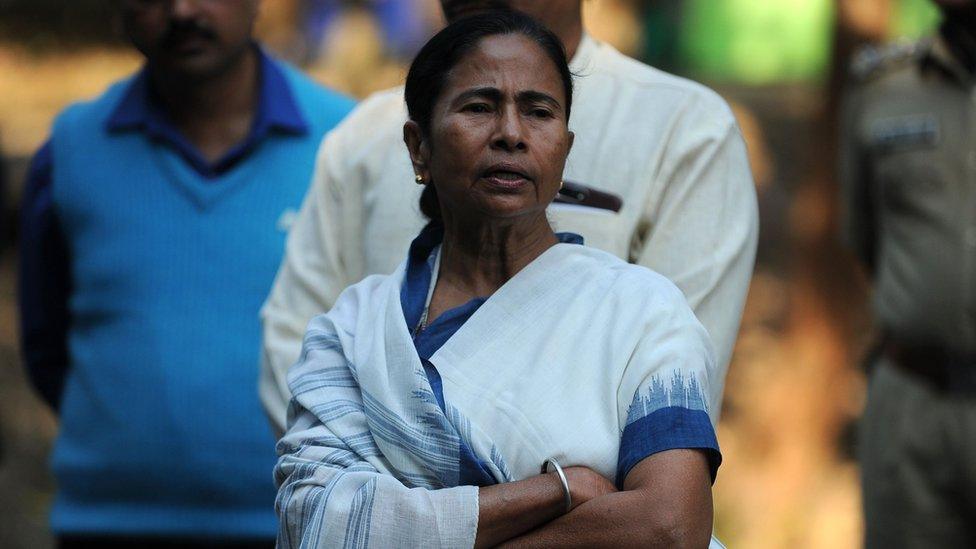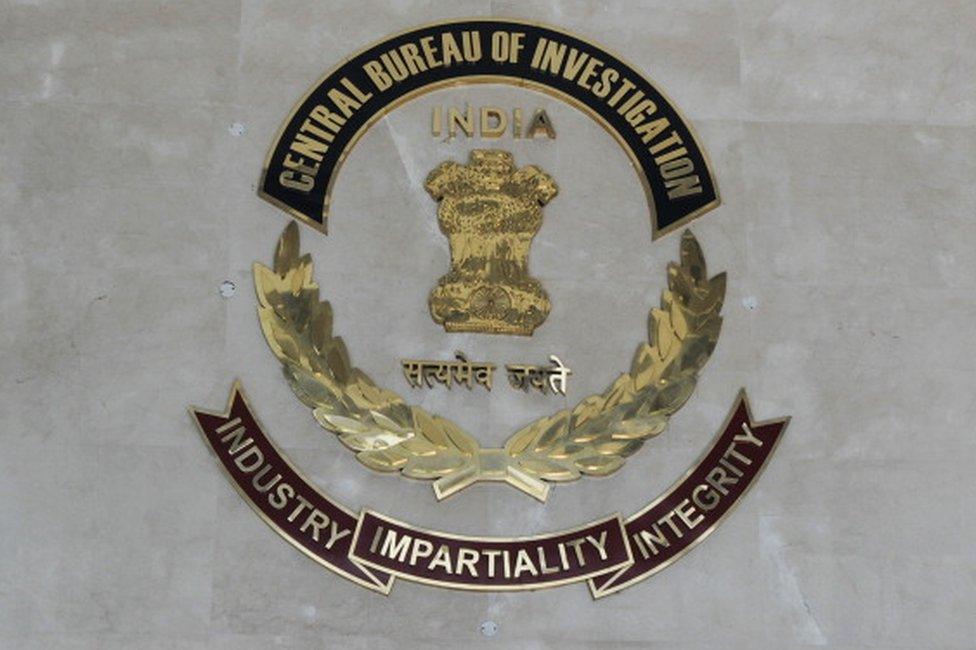Why 'India's FBI' agents are clashing with police
- Published

Mamata Banerjee is a rare firebrand woman leader who commands mass support
Imagine state policemen in the US detaining FBI agents investigating a case on state territory.
Then imagine the governor of the state starting a public protest against the FBI and the president for carrying out what she calls an act of vendetta against her government.
Now imagine federal forces being deployed to protect their offices in the state, fearing attacks by supporters of the governor.
This possibly sounds like a plot from a dystopian political novel. But it is what is happening in India.
A group of detectives belonging to India's federal investigation agency, the CBI, arrived at the well-secured home of the commissioner of police of Kolkata (formerly known as Calcutta) in West Bengal state on Sunday evening. They said they wanted to question Rajeev Kumar in connection with a ponzi scandal. (The multi-million dollar scam, involving businessmen, politicians, journalists and film producers, defrauded a large number of small investors.)
But Mr Kumar refused to meet the detectives. Instead his forces detained the agents - who are recruited from the police forces themselves - and took them away to a police station. They were freed after a few hours, and returned without being able to question Mr Kumar.
Mr Kumar had led the early local investigation into the scandal, before the case was taken over by the CBI under the supervision of the Supreme Court. The federal agency, say reports, unsuccessfully tried to question Mr Kumar half-a-dozen times in the past in connection with some evidence he had purportedly collected in the case. The agency believes that he is "hiding" something.
The ponzi scandal, involving at least two small investment companies, came to light in 2013 under the watch of the leader of West Bengal state. In India's male-dominated politics, Mamata Banerjee is a rare firebrand woman leader who commands mass support. She took power in 2011, ending 34 years of communist rule in the state. (The following year, she was named one of Time magazine's 100 most influential people in the world.) The feisty Ms Banerjee has ruled West Bengal ever since.

The Central Bureau of Investigation is India's top investigation agency
Ms Banerjee has a testy relationship with the federal government, run by Prime Minister Narendra Modi's Bharatiya Janata Party (BJP). This is, in part, because Mr Modi's party is trying to make inroads into Bengal, using its usual mix of development promises and sectarian rhetoric.

More on India from Soutik:

After a series of setbacks in state polls Mr Modi no longer looks invincible in general elections due this summer. And Ms Banerjee, an astute rival, is trying to position herself as a prime ministerial contender, in the event of an opposition win. Recently, she organised a well-attended meeting of 23 opposition parties who vowed to defeat Mr Modi.
Ms Banerjee, who is now holding an "indefinite" public protest in Kolkata, accuses Mr Modi's party of targeting her government.
The BJP picked up 17% of vote share - but just two seats - in Bengal in the 2014 general elections. The party is desperately hoping for an improved performance this summer. It accuses Ms Banerjee of triggering a "constitutional crisis" by setting her police on federal agents. Historian Ramachandra Guha says the latest battle is a "war between two ruthless and amoral politicians with absolute and equal disregard for institutional propriety".
In the end, this unprecedented - and ugly - incident is actually symptomatic of a worrying erosion of India's institutions and the regrettable breakdown of political bipartisanship.
The CBI, which reports to the ruling federal government, was once described as a "caged parrot" and has been used by successive governments to hobble political opponents. It has, many believe, lost credibility. In October, the government had to remove the two men at the top of the agency after each accused the other of corruption.
The standoff is the latest manifestation of a crisis that has often bedevilled the Indian state: the inability of an extremely powerful federal government - Mr Modi rules with an outright majority - to handle equally powerful and assertive regional leaders. It is a crisis which is at the heart of India's federalism.